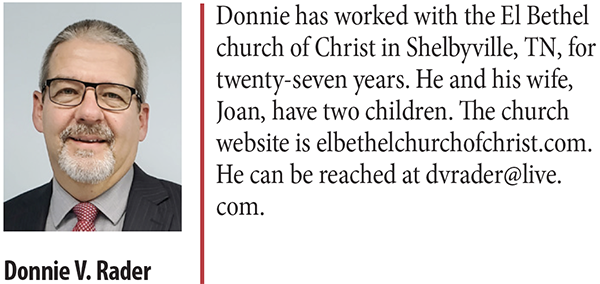by Donnie V. Rader
Synopsis: Elders must use wisdom as they lead the congregation in trying to bring the wayward back home to God. When such efforts are unsuccessful, may local shepherds fulfill the difficult duty of exercising discipline properly and productively.
Some sheep among the fold of God that will go astray (Gal. 6:1; Jas. 5:19-20). Shepherds of the local church must lead and guide the rest of the flock in trying to bring the wayward home. What should elders do in their work with those who are wayward?
Elders have the responsibility of watching out for souls (Heb. 13:17). Several things are included in that task.
In some churches discipline is not practiced and God’s will on the matter is not taught. When such is the case, the command to withdraw will be forgotten (1 Cor. 5; 2 Thess. 3). Shepherds who properly feed the flock make sure the church is well informed about all aspects of church discipline.
Shepherds are responsible for all the teaching that takes place within a local congregation (Acts 20:28). If the truth is being properly taught, it will build up those who hear (Acts 20:32).
Shepherds who care about the sheep will know them well enough to see early signs of any change taking place. Such problems are more easily dealt with in the early stages.
Despite the best efforts to prevent departure, some will still stray from the fold (Jas. 5:19-20). When that happens, what should the elders do?
When one is wayward, we should seek to restore him before any consideration is given to withdrawing. As an elder, I have often gone to see one who is unfaithful. Such indivividuals may ask, “Are you going to withdraw from me?” My response always is that withdrawing is not even on our radar at the moment. We are hoping that he will change his heart before that discussion needs to take place.
Even the heretic is not to be rejected until there has been a second admonition (Titus 3:10). Those efforts will involve, not only each elder making an appeal, but also encouraging the congregation to visit, call, or in some way contact the erring. If the church may later be asked to withdraw from the unfaithful (1 Cor. 5:4), surely, they should be involved in the effort to restore.
While elders should not be trigger-happy on withdrawing from the unfaithful, neither should they wait so long that any discipline becomes ineffective. The church at Corinth was rebuked for not taking action before they did (1 Cor. 5). I have known of churches waiting for a year or two before they begin to suggest they may need to withdraw from one who persists in sin.
Paul wrote to the Thessalonians saying that those who are over you (elders) admonish you (1 Thess. 5:12). The NKJV footnote says, “instruct or warn” (which is the same word as “warn” [v. 14]). Those who are “unruly” (i.e., same word as disorderly [2 Thess. 3:6]) are to be warned (1 Thess. 5:14).
By warn, we do not merely mean that he should be warned that he will be subjected to disciplinary action; rather, warn him of the danger that awaits if he does not change his spiritual condition. He is in sin, separated from God (Jas. 1:15; 5:19-20; Rom. 5:12), and will lose his soul eternally if he does not repent (Rom. 6:23).
Despite the best efforts to bring the erring to repentance, some will persist in sin and the time will come when action must be taken to withdraw (1 Cor. 5; 2 Thess. 3). Here, leaders must exercise wisdom. How they (the elders) and the congregation handle the matter of discipline will make all the difference in its effectiveness.
Clarify to the congregation that this is the action of the whole church. The case at Corinth shows that the whole church was involved (1 Cor. 5:4; 2 Cor. 2:6). It is not just the elders taking action, but the whole church. Since the whole church is expected to agree and support the disciplinary action, they are entitled to know the facts. Think of the power that has if every member worked toward restoring the erring (Gal. 6:1).
This is where elders can use wisdom. Don’t make announcements that sound like “We, the elders are withdrawing from this brother.” Rather, clarify that we are leading the congregation in the matter.
The purpose of disciplinary action is two-fold. Shepherds should not only know but instruct the congregation of the purpose. If withdrawing is commanded (1 Cor. 5; 2 Thess. 3), then it has some important purpose. “The Scriptures do suggest, however, that discipline has both a corrective and protective function” (Jackson).
First, this is a continual effort to bring the erring to repentance. The church at Corinth was told to withdraw from the fornicator so that his spirit might be saved (1 Cor. 5:5). The church at Thessalonica was told to withdraw that the brother might be ashamed (2 Thess. 3: 6-15).
Secondly, this action is to keep the church pure. In dealing with the fornicator, Paul said that “a little leaven leavens the whole lump” (1 Cor. 5:6), so he says to put away the one living wickedly (v. 13). When such action is taken, others take note and learn that sin has consequences (cf. Deut. 21:18-21; Acts 5:11; 1 Tim. 5:20). When discipline is not practiced, the sinner persists in his sin, as was the case at Corinth (1 Cor. 5). As a result, the church is then corrupted.
The one who is the subject of withdrawal walks disorderly. Paul instructs the Thessalonians to withdraw from those who walk disorderly (2 Thess. 3:6). The same writer clearly shows a difference in one who is weak and one who is unruly (1 Thess. 5:14). Please note that this same word is translated “disorderly” in 2 Thessalonians 3:6.
The word translated “disorderly” is a military term meaning “not keeping rank” (Vine, 174). Thayer’s Greek-English Lexicon says the word means, “disorderly, out of ranks, (often so of soldiers). . . deviating from the prescribed order or rule” (Thayer, 83).
Elders must lead in the procedure. Since the Bible does not specify the details of the procedure, this is an area in which shepherds must exercise wisdom. After ample admonition, the erring should be informed of the intent to withdraw from them. The instructions of 1 Corinthians 5 and 2 Thessalonians 3 imply that the erring know what is going on—otherwise, how effective will it be? How the elders inform the erring is not specified. They may deliver the message personally and orally, or they may inform him by letter. How much time is allowed between informing the wayward of the intent to withdraw and the action of withdrawing is a also matter of judgment.
There is an aspect of this action that takes place in the assembly (1 Cor. 5:4). This lets the church know what is going on and marks the point at which the brethren no longer have fellowship with the erring. How this public action is handled by the elders will make a tremendous difference. In taking such action, they should show love and kindness (Rom. 13:10; 1 Cor. 16:14). Their sincere desire to bring the wayward back should be evident to all.
Jackson, Wayne. “Church Discipline—A Tragic Neglect.” Christian Courier Vol. XXVI, No. 9, January 1991, https://www.christiancourier.com/articles/207-church-discipline-a-tragic-neglect.
Thayer, Joseph Henry. A Greek-English Lexicon of the New Testament. New York: Harper & Brothers., 1889.
Vine, W. E., Merrill F. Unger, and William White Jr. Vine’s Complete Expository Dictionary of Old and New Testament Words Nashville, TN: Thomas Nelson, 1996.



